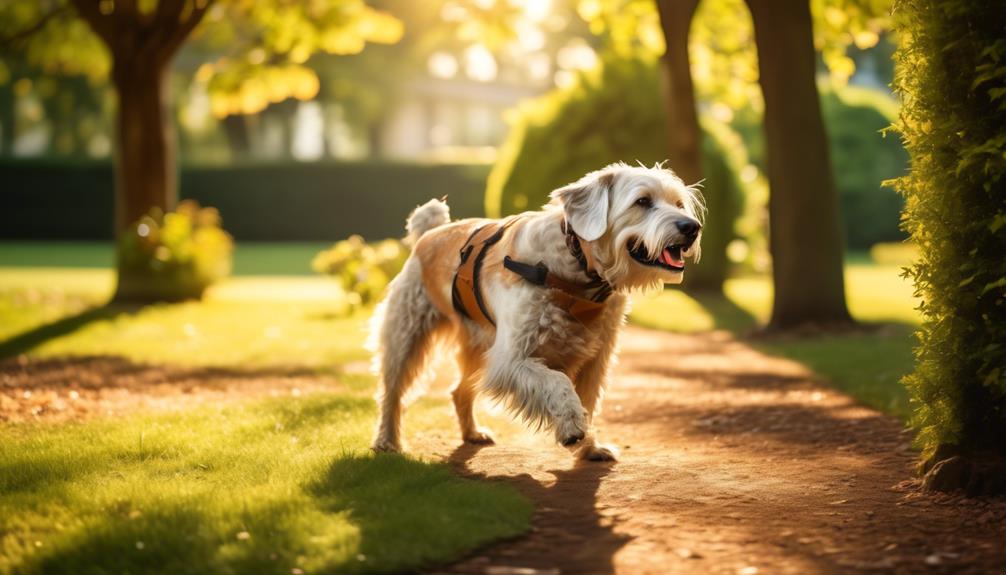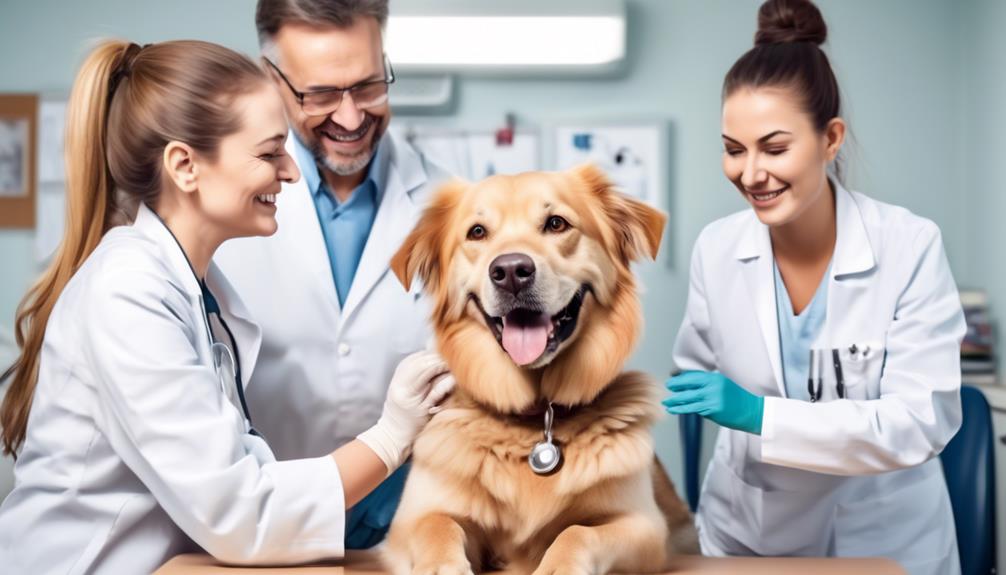What Are the Best Ways to Support an Aging Dog's Immune System?
As your loyal companion ages, you may notice changes in their energy levels and overall health. Providing the best support for your aging dog's immune system is crucial for their well-being.
You might be wondering about the most effective ways to ensure their immune health as they enter their senior years. There are various factors to consider, from nutrition and exercise to supplements and regular veterinary care.
It's essential to understand how these elements play a role in bolstering your furry friend's immune system and overall vitality.
Importance of Immune Health
Ensuring the importance of immune health for your aging dog can't be overstated. As dogs age, their immune system may weaken, making them more susceptible to illnesses and infections. Just like humans, aging dogs need a strong immune system to fight off diseases and maintain their overall health and well-being.
The immune system is a complex network of cells, tissues, and organs that work together to defend the body against harmful invaders. In aging dogs, the immune system may not function as efficiently as it did in their younger years. This decline in immune function can lead to an increased risk of infections, chronic diseases, and other health issues. Therefore, it's crucial to prioritize immune health to support your aging dog's overall vitality and quality of life.
To support your aging dog's immune system, you can take several proactive steps. Providing a balanced and nutritious diet, regular exercise, and proper veterinary care are essential for maintaining a strong immune system.
Additionally, incorporating immune-boosting supplements, such as vitamins and antioxidants, into your dog's daily routine can help support their immune health as they age.
Balanced Nutrition for Aging Dogs
Maintaining a balanced and nutritious diet is essential for supporting the health and vitality of your aging dog. As your furry companion grows older, their nutritional needs evolve, and providing them with the right balance of nutrients becomes crucial for their overall well-being.
To ensure your aging dog receives the best nutrition, consider the following:
- Nutritional Supplements: As dogs age, their bodies may require additional support in the form of nutritional supplements. Certain vitamins, such as vitamin E and C, can aid in bolstering the immune system and overall health. Additionally, omega-3 fatty acids can help reduce inflammation and support joint health, which is especially beneficial for aging dogs.
- Digestive Health: Aging dogs may experience changes in their digestive health, such as decreased nutrient absorption and a sensitive stomach. To support their digestive system, consider incorporating probiotics into their diet. Probiotics can help maintain a healthy balance of gut bacteria, aid in digestion, and support overall gut health.
- Balanced Diet: Providing a well-balanced diet that's tailored to your aging dog's specific needs is paramount. Choose high-quality, easily digestible protein sources, such as lean meats, to support muscle health. Additionally, ensure that their diet includes a proper balance of carbohydrates, healthy fats, vitamins, and minerals to support their overall health and immune system.
Regular Exercise and Mental Stimulation

As your aging dog's nutritional needs evolve, it's important to ensure they engage in regular exercise and receive mental stimulation to support their overall well-being. Play therapy and cognitive games are excellent ways to keep your dog's mind active and engaged. These activities can include hide-and-seek with treats, interactive puzzle toys, or teaching your dog new tricks. Engaging in these activities not only provides mental stimulation but also helps strengthen the bond between you and your furry friend.
Outdoor activities are also crucial for maintaining your aging dog's physical health. Taking leisurely walks, swimming, or gentle hikes can help keep your dog's joints mobile and maintain a healthy weight. Additionally, being outdoors provides mental stimulation through exposure to new sights, sounds, and smells, which can help keep your dog's mind sharp.
Incorporating puzzle toys into your dog's routine can also provide mental stimulation. These toys encourage problem-solving and can help prevent cognitive decline in aging dogs. By rotating different toys and activities, you can keep your dog mentally engaged and prevent boredom.
Proper Hydration and Water Intake
To keep your aging dog healthy, make sure they have access to an ample supply of fresh, clean water throughout the day. Proper hydration is crucial for supporting your dog's immune system and overall well-being. Here are some water intake tips to ensure your aging dog stays properly hydrated:
- Monitor water intake: Keep an eye on how much water your aging dog is drinking on a daily basis. Changes in water consumption can be an early indicator of health issues, so it's important to be aware of any significant increases or decreases in their water intake.
- Hydration benefits: Adequate hydration is essential for supporting your dog's immune system, aiding in digestion, regulating body temperature, and promoting overall organ function. Proper hydration also helps in maintaining healthy joints and mobility, which is especially important for aging dogs.
- Fresh water availability: Always provide your aging dog with access to fresh, clean water. Regularly check and refill their water bowl to ensure it's always available to them, especially during hot weather or after physical activity.
Quality Sleep and Stress Management

Supporting your aging dog's immune system through proper hydration also involves ensuring they've quality sleep and managing their stress levels effectively. Just like in humans, quality sleep is crucial for your dog's overall well-being, including their immune system. Adequate rest helps regulate their hormones, repair damaged cells, and strengthen their immune response.
To promote good sleep quality, create a comfortable and quiet sleeping environment for your dog. Providing a cozy bed in a peaceful area of your home can help them relax and sleep better. Additionally, maintaining a consistent bedtime routine can signal to your dog that it's time to wind down and prepare for rest.
Stress reduction is also vital for your aging dog's mental health and immune function. High stress levels can weaken the immune system and make your dog more susceptible to illnesses. To manage your dog's stress, consider incorporating relaxation techniques into their daily routine. Activities such as gentle massages, soothing music, or aromatherapy can help alleviate stress and promote a sense of calm.
Regular exercise is another effective way to reduce stress and boost your dog's overall well-being. Engaging in physical activities that your dog enjoys, such as walks, playtime, or swimming, can help lower stress levels and improve their mental and physical health.
Supplements for Immune Support
Consider incorporating immune-boosting supplements into your aging dog's diet to support their overall health and well-being. There are several supplements that can help bolster your furry friend's immune system and promote their vitality as they age.
Here are three types of supplements that can provide crucial support for your aging dog's immune system:
- Herbal Remedies and Natural Antioxidants: Look for supplements containing natural ingredients such as turmeric, ginger, and green tea, which are known for their immune-boosting properties. These herbs and antioxidants can help reduce inflammation, fight free radicals, and support your dog's overall well-being.
- Probiotic Supplements: Probiotics are beneficial bacteria that support gut health, which is closely linked to the immune system. By promoting a healthy balance of gut flora, probiotic supplements can help strengthen your dog's immune response. Additionally, consider adding omega-3 fatty acids to their diet, as these healthy fats can further support their immune function and reduce inflammation.
- Omega-3 Fatty Acids: Omega-3 fatty acids, commonly found in fish oil supplements, can provide anti-inflammatory benefits and support overall immune health. These essential fatty acids are known to promote healthy skin and coat, reduce joint discomfort, and support cardiovascular health in aging dogs.
When choosing supplements, it's important to consult with your veterinarian to ensure that they're appropriate for your dog's individual health needs and to determine the correct dosage. By incorporating these immune-boosting supplements into your aging dog's routine, you can help them maintain a strong and resilient immune system as they enter their senior years.
Regular Veterinary Check-ups

Regular veterinary check-ups are essential for monitoring your aging dog's overall health and addressing any potential concerns early on. By scheduling regular preventative care appointments with your veterinarian, you can ensure that your furry companion receives the necessary wellness exams to maintain their immune system and overall well-being.
During wellness exams, your veterinarian will conduct a thorough physical examination to assess your aging dog's body condition, weight, mobility, and any signs of discomfort or illness. These routine check-ups allow for the early detection of any age-related issues such as arthritis, dental problems, or organ dysfunction, which can impact your dog's immune system. Additionally, your vet will review your dog's vaccination status and discuss any necessary updates to protect against common diseases.
Furthermore, regular veterinary check-ups provide an opportunity to discuss your aging dog's diet, exercise routine, and any changes in behavior or habits. Your vet can offer tailored advice on nutrition and lifestyle adjustments to support your dog's immune system as they age.
Environmental Enrichment and Socialization
Ensuring your aging dog's well-being involves providing environmental enrichment and socialization to support their overall health and immune system.
Environmental enrichment can significantly contribute to your aging dog's immune system and cognitive function. Here are a few ways to enhance your aging dog's environment and socialization:
- Indoor activities, outdoor exploration: Engage your aging dog in stimulating indoor activities such as puzzle toys, gentle training exercises, and interactive play. Additionally, regular outdoor exploration in safe and familiar environments can provide mental stimulation and physical activity, which are essential for supporting your dog's overall well-being.
- Canine companionship, human interaction: Socialization with other dogs can be immensely beneficial for your aging dog. It provides mental stimulation, exercise, and emotional support. Furthermore, regular human interaction, including gentle petting, grooming, and positive reinforcement, can contribute to your dog's emotional well-being and overall immune system support.
Incorporating environmental enrichment and socialization into your aging dog's routine can have a profound impact on their overall health and immune system. By providing a stimulating environment and ample social interaction, you can help your aging dog maintain their cognitive abilities, emotional well-being, and overall health.
Frequently Asked Questions
Can Specific Breeds of Dogs Have Different Immune System Needs as They Age?
As dogs age, specific breeds may have different immune system needs. It's important to consider breed-specific considerations when addressing dietary requirements for aging dogs. Providing targeted support can help maintain their immune system health.
Are There Any Natural Remedies or Holistic Approaches to Supporting an Aging Dog's Immune System?
You can support an aging dog's immune system with herbal supplements, dietary changes, acupuncture, and massage therapy. These natural remedies and holistic approaches can help boost your dog's overall health and well-being as they age.
How Can I Tell if My Aging Dog's Immune System Is Compromised?
If you notice signs or symptoms like frequent infections, slow healing, or lethargy in your aging dog, it's important to consult a veterinarian. A consultation can help determine if your dog's immune system is compromised.
Are There Any Specific Environmental Factors That Can Impact an Aging Dog's Immune Health?
Specific environmental factors like diet and exercise can impact an aging dog's immune health. Regular veterinary checkups are important for aging dogs to monitor their immune system and overall well-being.
What Role Does Dental Care Play in Supporting an Aging Dog's Immune System?
Taking care of your aging dog's dental health is crucial. Nutrition in dental care and regular check-ups are vital. Poor dental health can lead to infections that weaken the immune system, so prioritize dental care for your senior pup.
Conclusion
So, remember to prioritize your aging dog's immune health by providing:
- Balanced nutrition
- Regular exercise
- Proper hydration
- Quality sleep
- Supplements
Don't forget to:
- Schedule regular veterinary check-ups
- Provide environmental enrichment
- Provide socialization
By taking these steps, you can help support your aging dog's immune system and ensure they live a long and healthy life.
